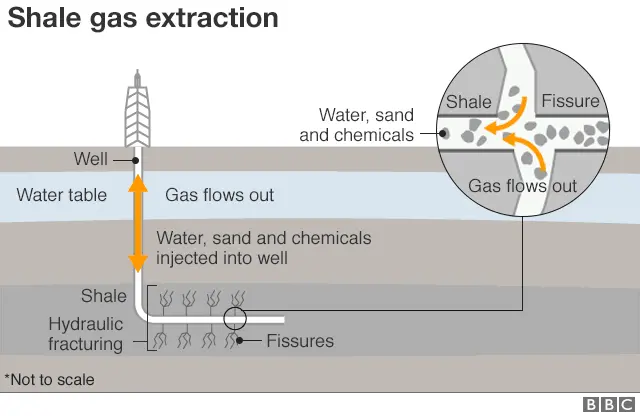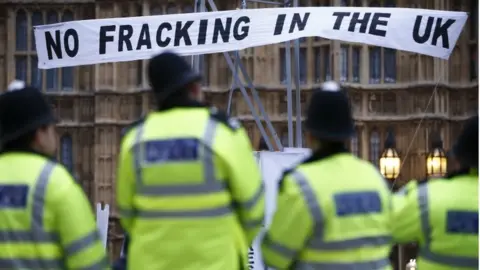Fracking tsar resigns after six months over 'ridiculous' rules
The UK's shale gas commissioner is resigning after just six months, saying fracking is being throttled by rules preventing mini earthquakes.
Current government rules mean fracking must be suspended every time a 0.5 magnitude tremor is detected.
But Natascha Engel, a former Labour MP, said the cautious approach to tremors had created a de facto ban on fracking.
She claimed campaign groups "were driving policy" - but the groups say fracking damages the environment.
In her resignation letter, Ms Engel - who was MP for North East Derbyshire from 2005 to 2017 - said government was "pandering to what we know to be myths and scare stories" about shale gas extraction.
'Terrible paralysis'
She told BBC News that when she took up the post, there had been an understanding that fracking would struggle to develop if the "really ridiculously low" limits on tremors had not been increased.
Ms Engel said the role had been her ideal job but that "where you've got government in such terrible paralysis, you do have to do something as dramatic as this" in order to have your voice heard.
She added: "The profile of environmentalism has really been raised and I think the need to reduce our carbon emissions is absolutely urgent and fracking is absolutely one way we can do that."
A spokesperson for the government said it was confident that current regulations "strike the right balance in ensuring the industry can develop, while ensuring any operations are carried out safely and responsibly".
Ministers created the commissioner role to give confidence in regulation to local communities, the industry and regulators.
In January, the government told shale firm Cuadrilla it had "no intention of altering" the regulations after the rules repeatedly halted work in Fylde, in Lancashire.
Labour leader Jeremy Corbyn has called for a ban on fracking which he has said is "not compatible with climate change prevention".
On Wednesday, the party is expected to call for a dramatic cut in the UK's carbon emissions and to press the government to declare a national "climate emergency".
Ms Engel's departure will be welcomed by green groups who said her pro-fracking views precluded her from being an honest broker.
A spokeswoman for the environmental protest group Extinction Rebellion said Ms Engel's resignation meant the government should "rethink" its energy policy and move away from fossil fuels.
Francis Egan, chief executive of Cuadrilla, which is in charge of shale gas extraction at sites in Lancashire, said: "Natascha Engel has accurately assessed the current situation with regard to shale gas extraction in the UK. UK shale explorers have spent hundreds of millions of pounds proving that we have enough gas beneath our feet to supply homes across the country for the next 50 years."
He added: "We remain wedded to a miniscule micro-seismic threshold which has no scientific basis and is without parallel anywhere else in the world. Meanwhile other industries - including key Government projects like Crossrail, quarrying operations and geothermal - produce ground vibrations far in excess every working day. The situation is beyond ridiculous, it's embarrassing."
So, what is the issue?
The key issue is a government rule that forces the industry to stop fracking every time there is a micro-tremor of 0.5 magnitude.
Miss Engel said: "This amounts to a de facto ban. The paralysis we are seeing in Parliament (on fracking policy) is made worse by social media and a powerful environmental lobby making impossible demands on CO2 emissions."
The government said it wanted to support fracking because gas produces fewer carbon emissions than coal.

Ms Engel said the result of the over-strict regulations would be difficulty in making those CO2 reductions, lower economic growth, and less energy security - as the UK would need to import gas rather than produce its own.
She continued: "These points have been made repeatedly but ministers ignore them and instead allow campaign groups to drive policy.
"So many local businesses face collapse. They have invested vast amounts to 'get ready for shale' as the government had told them to. There is, therefore, no purpose in this role."
She pointed out that 49 geoscientists had recently called on the government to relax what they called the over-zealous regulations.
The Lancashire for Shale group said her departure was "a damning indictment of government dithering", calling for ministers to take another look at "overly cautious rules on mini earth tremors".
A spokeswoman said: "Instead of listening to the science and expert opinion, politicians appear to be taking their steer from a vocal minority, aided and abetted by well-funded international campaign groups and their slick PR machines."
 AFP
AFPHow will opponents of fracking respond?
Environmentalists will be delighted with Ms Engel's decision to quit. They argued that fracking rules on the crowded land of the UK must be far more rigorous than in the open spaces of the USA.
More fundamentally, they said it was madness for the UK to be seeking more gas when firms have already discovered far more fossil fuel than scientists say can be burned without wrecking the climate.
Greenpeace UK head of politics Rebecca Newsom said the fracking industry had been "stuck in a time warp" and that "it's not surprising some of its backers are getting tired of waiting", adding: "What's bad news for frackers is good news for everyone else."
Environmental charity Friends of the Earth said Ms Engel's suggestion that fracking could help reduce carbon emissions was "outrageous".
It added the government had already "bent over backwards to help the fracking industry", despite it being "bad news for our climate and environment" and "deeply unpopular with the public".
Earlier this week, the former CBI head Adair Turner said there was no place for fracking if the UK was to play its part in holding global temperature rise down to 1.5C.
The government's policy has also been influenced by its own backbenchers. This week, the Teesside MP Simon Clark said in Parliament that the time for fracking had come and gone.
Follow Roger on Twitter @RHarrabin
